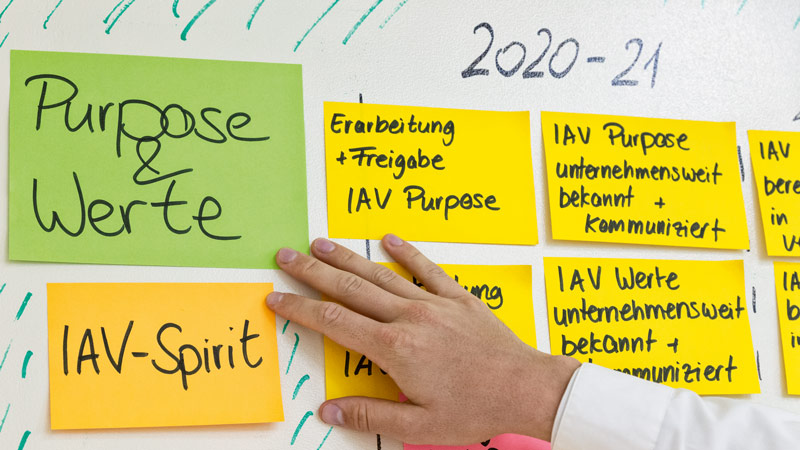“Don’t Just Talk About It. Do It!”
Chief Digital Officer Stefan Schmidt about the opportunities of digitalization for automotive development and new management concepts
What impact is digitalization having on everyday life, developer co-operation and the search for new business ideas? In the automotion interview, Stefan Schmidt, Chief Digital Officer (CDO) at IAV and head of the Digital Lab in Berlin, speaks about IAV’s digital transformation.
Mr. Schmidt, what does your job involve as Chief Digital Officer?
Schmidt: I am in a cross-departmental function responsible for IAV’s digital transformation. This is a huge issue because everything that can be digitized will be digitized in future. For us, this means that we must learn a new way of thinking across different divisions. Digitalization will, for example, alter our colleagues’ expectations. They will want to be more autonomous and work more in networks. Work and leisure time will increasingly merge. All this will demand a new staff management concept. In future, rather than keeping permanent checks, we will in many cases only provide our staff with orientation. They can then take responsibility themselves for deciding how to reach the goal or even define that goal itself.
What, actually, might these new forms of collaboration look like?
Schmidt: They will be defined by shallow hierarchies as well as working in teams and networks. We have already tested many of these new forms of agile working, such as hackathons, bar camps, brown-bag-sessions or crunch camps, in our Digital Lab in Berlin. They allow us to closely link our comprehensive expertise, based on many years of experience in the automotive sector, with the type of agility demanded today. This encourages creative thinking and action. It makes me feel certain that formats of this type will play an important part in our everyday work routine.
What else have you tried out in the Digital Lab?
Schmidt: A further interesting format is “ideas pitching”. It gives colleagues with new ideas a platform for presenting them and for attracting interest in implementing them. Anyone can come to me directly, present their idea in the Digital Lab and apply for seed capital like a start-up. If he or she is successful, we scrutinize the potential of the proposed idea: is the idea marketable? Is IAV in command of the necessary technologies? And ultimately: should IAV take a closer look at the idea? This also illustrates the unique concept behind our Digital Lab. It is no classic division but, in addition to the core team, is made up of individual idea generators. We provide them with rooms, tools and money, and they must then look for campaigners from across the company who are interested in turning their idea into practice. Taking all this into account, the motto is: Don’t just talk about it. Do it!
What is the response like from IAV staff?
Schmidt: Very positive! They have already put forward many new ideas. Without doubt, this is because we provide the colleagues in the Digital Lab with modern, inspirational spaces for this new form of collaboration. But we also demand something from them: the Digital Lab requires that they take personal responsibility. There is no line manager who constantly monitors a project’s progress. Anyone working here must be able to think as an entrepreneur and in future, digitalization will make this the case throughout the company to an increasing extent. For this reason, we also want to get the idea of the Digital Lab into other sites.
Speaking of tools: what will digitalization change in this field?
Schmidt: One central aspect is the product development process in the digital age. Soon “virtual engineering” could put an end to using prototypes. Instead of constructing real-world vehicles, digital models could serve as the basis for testing and validation. This will have a huge impact on our work. Digital methods will give development results an earlier degree of maturity, making it possible for us to provide virtual validation early on in the process. Modifications to the concept or components can be implemented at any time in the digital models. These new strategies will put us in better stead to accommodate our customers’ wishes and meet them even more effectively.
Will all these changes turn IAV into a com- pletely different company in future?
Schmidt: We must include the challenges and opportunities from digitalization, particularly in respect of modern working and management models, into our corporate philosophy. But this is no new development. IAV has constantly changed ever since it was founded in 1983 – not least through digital technologies. We were very quick to take the lead in electronics and mechatronics, and have consistently extended this expertise. This has enabled us to take on a leading position in the aspects that dominate automotive development today. For instance this applies to software development, automation, control engineering, vehicle, big data and artificial intelligence. To some extent, the subject of “digitalization” has accompanied us for many years. Today, it is important to be quick in picking up on the latest developments and utilizing them in the best possible way in the interest of our customers. This is precisely how I see my work. We always want to be the best partner for our customers. This is the expectation we place on ourselves and the reason why IAV will in future continue to develop innovative ideas and creative solutions while at the same time working closely with other labs, start-ups and research institutes. And this is what I am really looking forward to!
Mr. Schmidt, many thanks for talking to us!
